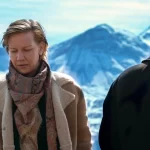What’s Old Is New Again, by David Bax
Probably one of the most prominent reasons a lot of mainstream filmgoers ignore period costume dramas – particularly the quiet Victorian era tales of yearning that one associates with Merchant Ivory and Oscar nominations for best costume design – is the language. The flowery dialog that is poetry to some, the very sound of romance, is laughable to most, risibly far from relatable and reeking of putting on airs. To these people, such fancy verbiage is the calling card of the pretentious and the rich. Those people will not want to see Cary Fukunaga’s Jane Eyre and they will be missing out because of it.
It’s true that the screenplay by Moira Buffini (Tamara Drewe) exists in the loftier echelons of human prose. Heavily descriptive and often declarative, it will do nothing to dissuade those who ignorantly avoid Masterpiece Theater fare but to those who pay attention, it makes a case for screenwriter as auteur just as well as The Social Network.
Buffini’s job here, as is the job of anyone adapting Charlotte Bronte’s great novel, is to faithfully translate while still making a work that was 150 years old when I was in high school apprehensible to a contemporary audience. To her unceasing credit, she did not chose to add anachronistic touches to the dialog or to eschew the aspects of the story that seem more old-fashioned. Instead, she set herself to making the world and time clear and coherent enough for the viewer to understand Jane’s actions, her thoughts and principles. Hence it becomes as plain as day just how remarkable she is.
The proto-feminism of Jane Eyre is remarkable for its time but Fukunaga and Buffini are not relying on their audience being scholars of literary history. To the modern mind even with a lowest common denominator version of feminist thinking, Jane’s desire to become a more or less subservient wife to a man who’s more a less a jerk most of the time doesn’t seem very progressive. The film, however, is an immersive and wholly convincing portrayal of a universe where being able to speak to your husband as equals – even if it’s likely to happen only in private – is a major advancement.
Buffini’s screenplay needed a worthy director to bring it to life and Cary Fukunaga (Sin Nombre) is more than equal to the task. He artfully and very subtly borrows techniques from contemporary horror filmmaking and weaves them into his fabric in such a way as to keep this earthbound and human tale suspenseful. He keeps his audience ever eager to crane their necks around the corner and see what’s coming next. As in Sin Nombre, he employs cinematographer Adriano Goldman who manages to suggest, as he did in the understated and underseen The Year My Parents Went on Vacation, a world as seen through the curious eyes of someone who is only allowed to experience a small piece of it. In the 1970’s Brazil of Vacation, it was a child. In the 19th century England of Jane Eyre, it is a woman.
I can’t imagine a better film having been made from Charlotte Bronte’s novel. Buffini and Fukunaga understand precisely what is captivating and downplay what isn’t. While it’s true that some of the plot contrivances of the last act are a bit too convenient for comfort, that has always been the case. The filmmakers involved take pains to convey that Jane arrives at being the person she is at the end on her own, with or without the story pieces that happen to fall into place for her.
The trick this film pulls off in the end is that is bridges eras. It manages to take place completely within its time period and exist externally completely for a modern viewer, while miraculously remaining a crackling story about an extraordinary person, losing nothing in translation.





























I agree that this film did a really good job of establishing a story that does not seem outdated. Although a few of Jane’s struggles seem a product of her time, they were presented in a way that allowed me to relate to everything she was going through on a very modern level. The choice of an age-appropriate extremely (physically) Plain Jane was essential to not taking the audience out of the film. If characters constantly referred to Jane as unattractive, but she was played by Keira Knightly with unbrushed hair it would have just been ridiculous. In this Jane, we are forced to focus on her other qualities which are the things that make her such an extraordinary character.